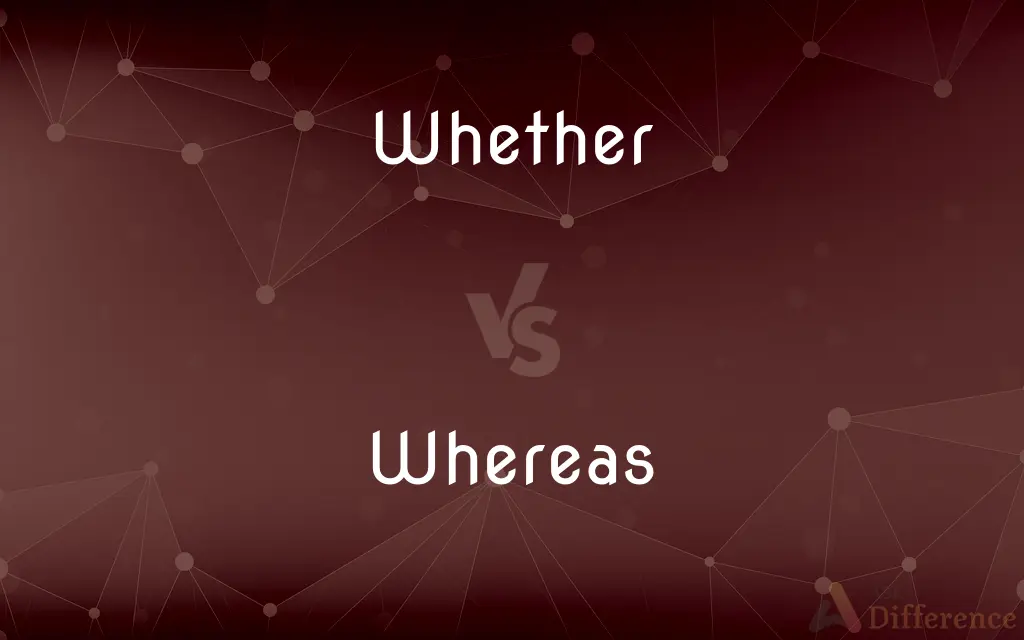Whether vs. Whereas — What's the Difference?

Difference Between Whether and Whereas
ADVERTISEMENT
Compare with Definitions
Whether
Used in indirect questions to introduce one alternative
We should find out whether the museum is open. See Usage Notes at doubt, if.
Whereas
It being the fact that; inasmuch as.
Whether
Used to introduce alternative possibilities
Whether she wins or whether she loses, this is her last tournament.
Whereas
While at the same time.
Whether
Either
He passed the test, whether by skill or luck.
ADVERTISEMENT
Whereas
While on the contrary.
Whether
(obsolete) Which of two.
Whereas
An introductory statement to a formal document; a preamble.
Whether
(obsolete) Which of two.
Whereas
A conditional statement.
Whether
(obsolete) Introduces a direct question between alternatives (often with correlative or).
Whereas
(obsolete) Where (that).
Whether
Indicates doubt between possibilities (usually with correlative or).
He chose the correct answer, but whether by luck or by skill I don't know.
Whereas
In contrast; whilst on the contrary; although.
He came first in the race, whereas his brother came last.
Whether
Without a correlative, introduces a simple indirect question.
Do you know whether he's coming?
Whereas
It being the fact that; inasmuch as. (Often used to begin recitals; sometimes emboldened or emphasized as a signifier.)
Whether
Introduces a disjunctive adverbial clause qualifying the main clause (with correlative or).
He's coming, whether you like it or not.
Whether or not you're successful, you can be sure you did your best.
Whereas
A clause, as in legal documents, stating whereas.
Whether
Which (of two); which one (of two); - used interrogatively and relatively.
Now choose yourself whether that you liketh.
One day in doubt I cast for to compareWhether in beauties' glory did exceed.
Whether of them twain did the will of his father?
Whereas
At which place; where.
At last they came whereas that lady bode.
Whether
In case; if; - used to introduce the first or two or more alternative clauses, the other or others being connected by or, or by or whether. When the second of two alternatives is the simple negative of the first it is sometimes only indicated by the particle not or no after the correlative, and sometimes it is omitted entirely as being distinctly implied in the whether of the first.
And now who knowsBut you, Lorenzo, whether I am yours?
You have said; but whether wisely or no, let the forest judge.
For whether we live, we live unto the Lord; and whether we die, we die unto the Lord; whether we live therefore, or die, we are the Lord's.
But whether thus these things, or whether not;Whether the sun, predominant in heaven,Rise on the earth, or earth rise on the sun, . . . Solicit not thy thoughts with matters hid.
Whereas
Considering that; it being the case that; since; - used to introduce a preamble which is the basis of declarations, affirmations, commands, requests, or like, that follow.
Whereas
When in fact; while on the contrary; the case being in truth that; although; - implying opposition to something that precedes; or implying recognition of facts, sometimes followed by a different statement, and sometimes by inferences or something consequent.
Are not those found to be the greatest zealots who are most notoriously ignorant? whereas true zeal should always begin with true knowledge.
Share Your Discovery

Previous Comparison
Monatomic vs. Monovalent
Next Comparison
Swoosh vs. Whoosh














































